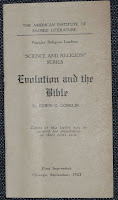From the Library: Evolution and the Bible
 For those just joining us, "From the Library" spotlights interesting items in the library of the Center for Origins Research at Bryan College.
For those just joining us, "From the Library" spotlights interesting items in the library of the Center for Origins Research at Bryan College.During the heyday of Bryan's antievolution movement, there were plenty of opponents of Bryan's crusade. It's easy to think of non-religious or even anti-religious individuals (like Mencken or Darrow), but there were plenty of religious folk upset with him too. One such opponent was Edwin G. Conklin.
Conklin was a developmental biologist and professor at Princeton. He was president of the American Society of Naturalists and eventually of the American Association for the Advancement of Science. In 1922, he wrote a little leaflet for the American Institute of Sacred Literature called "Evolution and the Bible." It is an archetypal anticreationist tract. All the major arguments I hear again and again are already there. Here's a few quotes you'll find familiar:
It is a dangerous thing for defenders of the faith to affirm that one cannot be a Christian and an evolutionist, for students of nature who find themselves compelled by the evidences to accept the truth of evolution will be apt to conclude that they must therefore count themselves as hostile to the Church. (p. 4)
These anti-evolutionists not only lack such first-hand knowledge but they often have no desire to get it even second-hand (p. 6)
Evolution is a guess only in the same sense as the doctrine of universal gravitation or any other great generalization of science is a guess. (p. 7)
... it is not fair or honest to quote the doubts of scientists regarding the causes of evolution as if they constituted an abandonment of the theory itself... (p. 8)
Everything which speaks for the evolution of plants and animals speaks plainly for the evolution of man. (p. 14)
All the evidences of evolution drawn from morphology, physiology, embryology, paleontology, homology, heredity, variation, etc., speak for the evolution of man as much as for that of any other organism. (p. 18)
Scientific investigators and productive scholars in every field have long since accepted evolution in the broadest sense as an established fact. (p. 23)As Yogi Berra might say, it's "deja vu all over again!"
There are also some interesting bits. In light of his theistic embryology, Steve Matheson should find this passage amusing:
If the evolution of a species is an atheistic theory, as some persons assert, so is the development of an individual, for natural development involves identically the same principles as does evolution. If one concedes the fact of individual development without supernatural interference, one might as well concede the fact of organic evolution without supernatural creation, so far at least as its effects on theology are concerned. (pp. 16-17)Conklin concludes with some good advice.
... in view of these considerations it may well be asked whether it would not be more fitting for such opponents of evolution to establish their own institutions for teaching their own views of science and theology ... rather than to attempt to convert existing institutions to that purpose. (p. 23)Thanks. We did, and we're doing fine.
Conklin. 1922. Evolution and the Bible. American Institute for Sacred Literature, Chicago.
Feedback? Email me at toddcharleswood [at] gmail [dot] com.